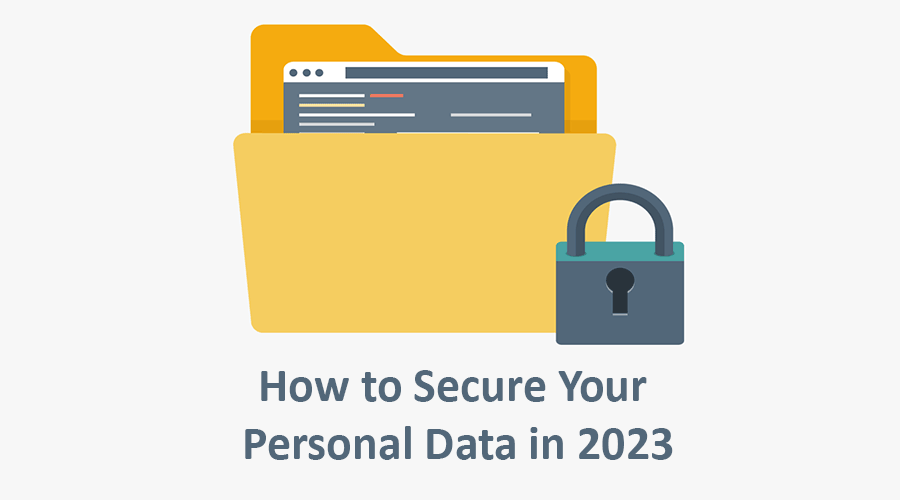
In our modern world, where data is the new gold, your personal information holds priceless value. Each click, each online conversation we have, leaves a digital footprint that can be tracked and, in the wrong hands, exploited. As we journey deeper into this digital era, guarding our personal information becomes more critical than ever. Consider me your amiable tour guide in this narrative, here to shed light on eight fundamental reasons why shielding your personal data isn't just advisable — it's compulsory. Furthermore, I'll equip you with a straightforward guide, a roadmap if you will, to help make your personal data as impenetrable as a fortress. Envision this piece as 'Data Security Made Easy'—perfect for students or anyone interested in breaking down complex ideas into simple, understandable language. So let's roll up our sleeves, put on our thinking caps, and dive right into this crucial topic!
Avoiding Identity Theft
Definition: Identity theft involves stealing someone's personal details, often for financial profit.
Why it's important: A rogue individual with your personal data could pretend to be you, apply for credit cards, make unauthorized purchases, or even commit crimes under your name.
How to protect your data:
- Use multi-factor authentication (MFA) wherever possible. It's like adding a second lock to your data's “door.”
- Change your passwords frequently, making them complex and distinctive. A reliable password manager can help.
- Stay alert to emails, text messages, or calls asking for personal data – these could be phishing scams.
Preventing Financial Fraud
Definition: Financial fraud is the act of misleading others involving financial transactions for personal advantage.
Why it's important: Cybercriminals can use your financial data to drain your bank accounts, make unauthorized transactions, or trade your information to other criminals.
How to protect your data:
- Regularly check your financial accounts for any suspicious activity.
- Only provide your financial details over secure and trusted platforms.
- Use credit cards over debit cards for online purchases. They generally have superior fraud protection.
Ensuring Personal Safety
Definition: Personal safety here refers to shielding yourself and your family from physical danger that might result from personal data leaks.
Why it's important: Your personal data can expose details about your lifestyle, family, residence, and routines, potentially making you a target for real-life threats.
How to protect your data:
- Be careful about what you post online; the internet never forgets.
- Regularly monitor what information about you is publicly available by searching your name on search engines.
- Delete old or inactive social profiles or accounts, and ensure apps like your schedule builder are from trusted sources and have appropriate security measures in place.
Managing Reputation
Definition: Reputation management involves safeguarding your public image and preventing damaging, false, or embarrassing information from being exposed.
Why it's important: Misused personal data can harm your reputation, impacting relationships, employment, and future prospects.
How to protect your data
- Be careful about what you post online; the internet never forgets.
- Regularly monitor what information about you is publicly available by searching your name on search engines.
- Delete old or inactive social profiles or accounts, and ensure apps like your 'schedule builder' are from trusted sources and have appropriate security measures in place.
Upholding Personal Freedom
Definition: Personal freedom, in the context of data privacy, is the right to control your own data and how it's utilized.
Why it's important: Your personal data can be used to monitor, regulate, and manipulate your actions or decisions without your consent.
How to protect your data:
- Stay aware of the kind of information you're allowing different applications and services to access.
- Employ a VPN (Virtual Private Network) to disguise your IP address and geographical location, effectively making you a ghost in the online world.
Reducing Spam and Intrusive Advertisements
Definition: Spam refers to unrequested messages sent over the internet, usually to a vast number of users, for advertising, phishing, spreading malware, and so on.
Why it's important: With your personal data, marketers or scammers can flood you with targeted spam or manipulative ads.
How to protect your data:
- Exercise caution when entering your email address or phone number online.
- Consider using an ad blocker or a browser with a built-in one.
- Use email accounts with robust spam filters.
Safeguarding Professional Information
Definition: Professional information encompasses data related to your job, such as workplace details, role, and professional connections.
Why it's important: Cybercriminals can use this information for corporate spying, professional identity theft, or tailored phishing attacks.
How to protect your data:
- Keep your professional and personal profiles separate, especially on social media.
- Be aware of social engineering attacks that might target you because of your professional role.
- Use secure, encrypted email and messaging services for work-related communication.
Preserving Digital Rights
Definition: Digital rights are the civil and legal rights of individuals in the digital world, including privacy rights and freedom of expression.
Why it's important: Protecting your personal data helps uphold these rights, prevents unwanted surveillance, and fosters trust in digital platforms.
How to protect your data:
- Support and advocate for legislation that safeguards consumer data rights.
- Use communication apps with encryption that can't read your conversations.
- Understand and exercise your rights under data protection laws, like the right to access, rectify, or erase your data.
Conclusion
Think of it this way: your personal data is like a sketch of you, outlining everything from your favorite pizza topping to your most visited websites. You wouldn't want just anyone filling in the colors of this sketch, would you? By knowing why it's so important and taking active steps to protect it, you can put down the paintbrush before anyone else gets a chance to pick it up, solidifying your personal space in the online world. Remember, on the vast internet, a good offense is the best defense. Stay digitally safe!




